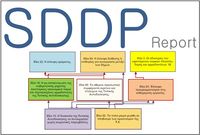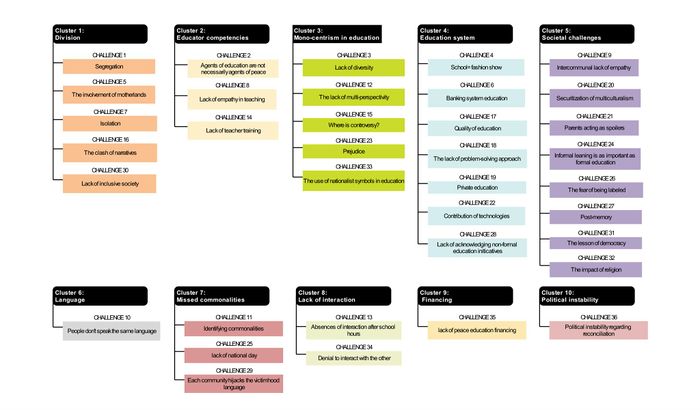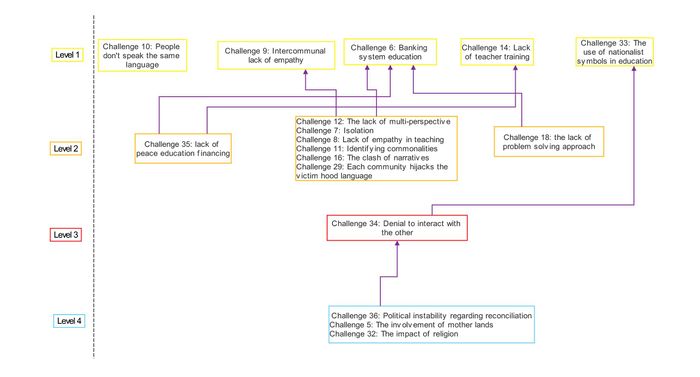SDDP Peace Education Initiative 2017- Challenges: Difference between revisions
Jordankent (talk | contribs) No edit summary |
Jordankent (talk | contribs) No edit summary |
||
| Line 25: | Line 25: | ||
<br> | <br> | ||
[[File:Peace_education_challenge_clusters.jpg|thumb|center|700px|upright=4.0|alt=MAP for MeDevNet Athens .|Sorted clusters from the Characteristics SDDP of the Peace Education Project 2017 TQ.]] | [[File:Peace_education_challenge_clusters.jpg|thumb|center|700px|upright=4.0|alt=MAP for MeDevNet Athens .|Sorted clusters from the Characteristics SDDP of the Peace Education Project 2017 TQ.]] | ||
[[File:Peace_education_challenge_map.jpg|thumb|left|700px|upright=4.0|alt=MAP for MeDevNet Athens .|Influence tree from the Characteristics SDDP of the Peace Education Project 2017 TQ.]] | [[File:Peace_education_challenge_map.jpg|thumb|left|700px|upright=4.0|alt=MAP for MeDevNet Athens .|Influence tree from the Characteristics SDDP of the Peace Education Project 2017 TQ.]]<br> | ||
<br> | <br> | ||
Revision as of 04:50, 25 April 2018
|
Executive Summary
The Triggering Question (TQ) was
What are the challenges facing the respecting educational systems in light of the continuing reconciliation process so as to render education in the respective communities catalytic and supportive of mutual understanding, cooperation and peaceful coexistence among the people of Cyprus?
In response to the TQ, the 11 participants came up with 36 characteristics, which were categorized in 10 clusters. Following the voting process, 23 ideas received one or more votes and 17 were structured to create the influence MAP shown below.
According to the participants of this workshop, appear to be the most influential were:
- Challenge 36: Political instability regarding reconciliation
- Challenge 05: The involvement of motherlands
- Challenge 32: The impact of religion
- Challenge 34: Denial to interact with the other
The workshop was facilitated by Yiannis Laouris, Harry Anastasiou, Katerina Fotiou and Ngam Leslie Timngum. The workshop was attended by 11 participants.
In sum, the participants of the dialogue reported their satisfaction that their voices have been heard and documented and communicated their expectations for follow-up activities to address the diagnosis of their needs.
Sponsor and partners
- Conflict Resolution Department
- Portland State University
- Hatfield School of Government
- Rotarian Action Group for Peace
Gallery
Participants
The participants were:
| # | Name and Surname | Age | Gender | Occupation |
|---|---|---|---|---|
| 1 | Ulus Irkad | 50+ | Male | Primary teacher (Phd student on Peace Education) |
| 2 | Sophia Arnaouti | 31-40 | Female | Global Education Officer |
| 3 | Okan Bullici | 18-30 | Male | Psychologist |
| 4 | Evie Grouta | 18-30 | Female | Freelance Educator |
| 5 | Yeliz Osman | 18-30 | Female | PhD candidate |
| 6 | Hazal Ozaktan | 18-30 | Female | Freelancer |
| 7 | Maria Loizou- Theodosiou | 50+ | Female | Teacher |
| 8 | Zehra Azizbeyli | 31-40 | Female | Lecturer |
| 9 | Katerina Antoniou | 18-30 | Female | Lecturer |
| 10 | Nasia Hadjigeorgiou | 18-30 | Female | University Lecturer (School of Law) |
| 11 | Pantelis Makris | 50+ | Male | Special Education Consultant |


